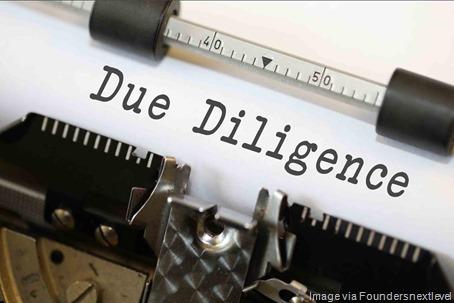 For the elite startups and entrepreneurs who manage to attract the investor they dream of, and survive the term sheet negotiation, there is still one more hurdle before the money is in the bank. This is the mysterious and dreaded due diligence process, which can kill the whole deal. In reality, it is nothing more than a final integrity check on all aspects of the business and the team.
For the elite startups and entrepreneurs who manage to attract the investor they dream of, and survive the term sheet negotiation, there is still one more hurdle before the money is in the bank. This is the mysterious and dreaded due diligence process, which can kill the whole deal. In reality, it is nothing more than a final integrity check on all aspects of the business and the team.
Some entrepreneurs do very little to prepare for due diligence, assuming all the talking has already been done, and the business plan and results to-date tell the right story. Others schedule exhaustive training sessions for everyone on the team, including showcase customers, to make sure that everyone paints a consistent picture. My best advice is to stick to the middle ground.
The Founder needs to remember that meetings up to this point have been primarily off-site, with staged demos, and managed personally by the CEO or a small team. Due diligence always involves on-site visits, informal discussions with any or all members of the team, vendors, and good customers as well as bad.
If there are conflicts within the team, or differing views of the strategy, or evidence of missing processes and tools, the investment process will likely be terminated. Even if the entrepreneur feels that all is well, it’s well worth the effort to prepare with the following actions:
- Make sure the whole team is up-to-date on the plan. That might start with the CEO giving the investor pitch to the whole organization, and distributing the current business plan document to everyone. Make sure all business processes are documented and integrated. If everyone has a different view of reality, you have no reality.
- Take time to review and resolve any personnel distractions. You need to brief the investor early if there are pending changes that have to be made, or conflicts that may become apparent during the due diligence process. Make sure everyone accurately posts their role with your startup on social media profiles, resumes, and references.
- Communicate what is happening and why to everyone. Don’t let the due diligence process be a surprise to the team. Make yourself available to answer any questions, show your enthusiasm, and explain both the positives and negatives of the external investment process.
- Visit reference customers, partners, and vendors. Use this opportunity to validate their satisfaction and support for your company and your solution. If you find open issues that can’t be immediately resolved, be sure to proactively communicate these to investors, with an action plan, rather than hope they won’t be found.
Based on the size of the investment, and the runway available, the due diligence process can take several weeks, or even a couple of months to complete. In any case, before the process starts on your startup, you should be doing your own reverse due diligence on the investor, as outlined in this article I published a while back.
For reference, here is a quick summary of key elements which most investors include in their due diligence process:
- Key personnel review. In all cases, an investor will ask to talk to all key players, and will likely follow-up by calling references and prior associates to verify background, commitment, and experience. Since investors tend to invest in people, more than the idea, the personnel review is normally the highest priority item.
- Status of the solution. Here investors are looking for feature problems or quality issues on the current product. A hard look will be taken at the technology maturity, the current development progress, and customer satisfaction with early product shipments. In addition, manufacturing and inventory levels will be reviewed.
- Review of opportunity and segmentation. A key criteria for a good investment is a large opportunity with double-digit growth. This should be a validation of prior assessments, based on any recent changes in trends, economic conditions and customer feedback data.
- Traction in the marketplace. A smart investor will take an independent final reading in the market on barriers to entry, active competition, demographics, and price sensitivity. Sales and distribution channel activity will be analyzed, as well as cost of customer acquisition, to make an independent assessment of your financial projections.
The key theme for a successful due diligence is full disclosure and no surprises before or after the commitment. If more marriages were subjected to the same rigor, the divorce rate would likely not be in the current fifty percent range. In business as in other relationships, people on the team that have to be above reproach, committed, and working on the same page.

